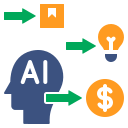Personalization with AI in Digital Marketing
Personalization with AI has become a transformative force in digital marketing, enabling brands to deliver content, offers, and experiences tailored to each individual user. Gone are the days of one-size-fits-all marketing strategies. With artificial intelligence, marketers can analyze vast amounts of data in real time and adapt to customer preferences almost instantly. This approach not only increases engagement and conversion rates but also fosters stronger, long-term relationships with customers. As the digital landscape becomes more competitive, leveraging AI-driven personalization has shifted from being a novelty to an essential component of effective marketing campaigns.
The Power of AI in Personalizing Customer Experiences
Real-Time Data Analysis for Enhanced Engagement
AI enables marketers to capture and process real-time data from multiple sources, such as web activity, mobile app usage, and social media interactions. By analyzing these data points as they happen, AI models can instantly adjust the content and offers presented to each user, ensuring higher relevance. For example, if a customer repeatedly browses a certain product category, AI can automatically showcase related items or provide personalized discounts. This dynamic adaptability increases the likelihood of conversions and creates a more satisfying, engaging customer journey.
Predictive Analytics for Anticipating Customer Needs
Predictive analytics powered by AI takes personalization a step further by forecasting future customer behaviors and preferences. By examining historical data and current trends, AI tools can predict when a customer is most likely to make a purchase, which products or services they might be interested in next, and even the preferred communication channels. Marketers can use these insights to proactively reach out with personalized messages or offers, ensuring they meet customer needs at the right time and in the right context.
Automated Content Personalization
AI-driven content personalization automates the process of delivering unique experiences to each visitor. By segmenting audiences based on behavior and preferences, AI can dynamically change website layouts, headlines, images, and offers for different users without manual intervention. Emails, advertisements, and even push notifications can be tailored to reflect the unique journey and interests of each recipient. This level of automation not only increases operational efficiency for marketing teams but also ensures a consistently seamless and personalized experience for customers at every touchpoint.

Improved Customer Retention and Loyalty
When customers receive marketing messages and experiences that truly resonate with their needs and preferences, they feel understood and valued by the brand. AI personalization makes this possible by ensuring that every interaction is relevant and timely. This emotional connection fosters a sense of loyalty and encourages repeat business, reducing churn rates. Over time, loyal customers become brand advocates, spreading positive word of mouth and contributing to long-term brand success.

Higher Conversion Rates and Revenue Growth
Personalized marketing powered by AI has a direct impact on key business metrics such as conversion rates and revenue. By presenting the right products or services to the right audience at the right time, AI increases the likelihood of purchase. From personalized product recommendations to individualized promotional offers, AI-driven tactics remove barriers to conversion and encourage upselling and cross-selling. This level of personalization translates into more efficient marketing spend and maximized return on investment.

Enhanced Customer Insights and Segmentation
AI provides marketers with unparalleled insights into customer behaviors, motivations, and triggers. With advanced analytics and machine learning algorithms, brands can move beyond traditional demographic segmentation to create highly nuanced audience groups based on real behaviors and preferences. This granular understanding allows for ultra-targeted campaigns, better product development, and more effective customer journey mapping. The continuous flow of data ensures that these insights remain up-to-date and actionable, keeping marketing strategies ahead of the curve.
Data Privacy and Ethical Considerations
Collecting and utilizing personal data for AI-powered personalization must be handled with the utmost care. Brands must ensure compliance with data protection regulations and maintain transparent data practices to earn customer trust. Ethical considerations also come into play when using algorithms to influence behaviors. Maintaining a customer-centric approach, providing clear opt-in choices, and safeguarding data privacy not only adheres to legal requirements but also fosters long-term trust and loyalty.
Integrating AI with Existing Marketing Technologies
Seamless integration of AI tools into existing marketing stacks can be complex, especially for organizations with legacy systems or disparate data sources. Achieving real-time personalization often requires consolidating data from various platforms and ensuring compatibility with current software. Successful implementation depends on choosing AI solutions that are flexible and interoperable, as well as investing in scalable infrastructure that supports ongoing innovation as organizational needs evolve.
Developing Internal AI Expertise and Resources
Adopting AI-driven personalization requires more than just the right technology—it demands skilled professionals who understand both marketing and data science. Organizations may need to upskill existing teams or recruit new talent to manage sophisticated AI systems and interpret insights effectively. Building a culture of continuous learning and fostering collaboration between marketing, IT, and data teams is critical to harnessing the full potential of AI personalization and driving sustained business growth.
